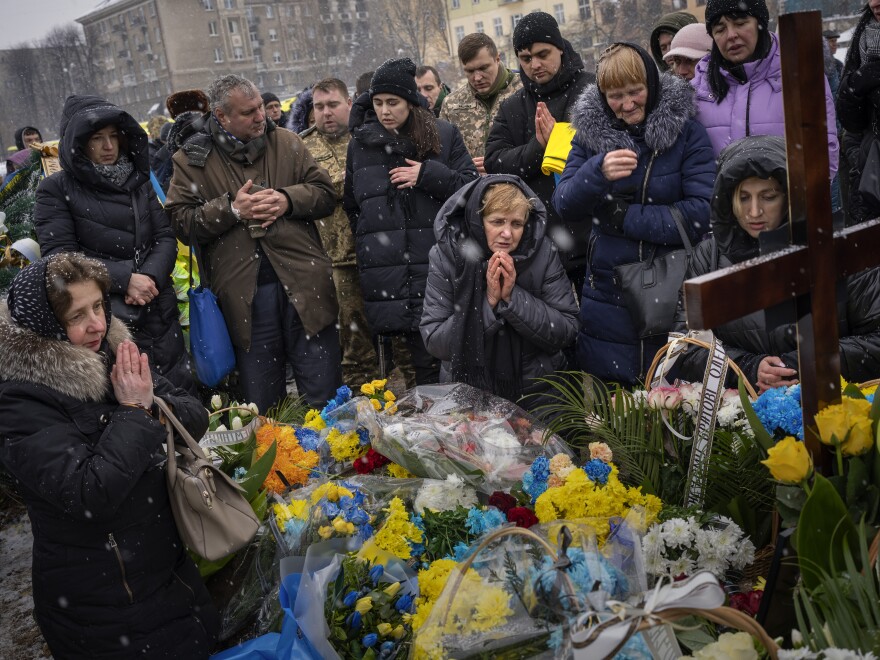It has been 12 months since Russia invaded Ukraine, a challenge to the global order not seen since World War II.
In a special report, NPR's Leila Fadel explores the human cost of Russia's ambitions, the ripple effects beyond Ukraine's borders, and the diplomatic and military efforts to stop the war.
Many expected Ukraine's capital to fall within days of the invasion, but Ukrainians fought and pushed Russian troops back. They've continued to fight. Russia recalibrated and is now focused on taking land in Ukraine's east. Both sides have gained and lost territory over the course of the year, but now the war appears to be at an inflection point.
"I do think this is a critical moment," Gen. Mark Milley, chairman of the Joint Chiefs of Staff, told NPR. "The battlefield, as difficult as it is and as bloody as it is ... is something that's going to play a very major factor in both President [Volodymyr] Zelenskyy and President [Vladimir] Putin's calculations as to whether or not to go to the negotiating table ... and under what conditions."
There are efforts to pursue accountability in the midst of war.
"This is something that leads me to the question - for whom do we document all these crimes?" Oleksandra Matviichuk, the head of the Center for Civil Liberties, told us. "Because I'm not a historian, I'm a human rights lawyer, and we document human pain in order sooner or later to have all these Russians ... brought to justice."
Matviichuk's organization won a Nobel Peace Prize for documenting war crimes in Ukraine.
Beyond the reality of living through war inside Ukraine, people around the world have felt the knock-on effect of the conflict as inflation and energy prices spike. It's also raised the specter of another possible invasion by a different global power.
Speaking to NPR's Leila Fadel, Taiwan's Foreign Minister Joseph Wu said his country is learning lessons from the war in Ukraine and keeping a wary eye on China.
"They have expansionist motivation. They want to continue to expand their sphere of influence. They want to continue to expand their power. And if they are not stopped, then they will continue to march on," Wu told us.
In the past year, the West has funneled billions in aid and weapons to Ukraine because the outcome has global consequences. Victory by Russia could mean new rules to the world order that global powers have lived by to avoid a third world war.
"We've managed to avoid conflict directly between great powers," Secretary of State Antony Blinken told NPR. "This system, for all its imperfections, works. But now, it's being challenged."
Twelve months into this war, Ukraine and Ukrainians have transformed. Tens of thousands of civilians and fighters are believed to be dead. Millions have been driven from their homes.
Among the displaced are Natalia Kravinsky and her son Volodymyr, who goes by Vova.
They tried to flee in the first days of the war, but the family car was shelled, Natalia believes, by Russian forces. Her husband was killed, along with her 6-year-old nephew, Maxim. Vova survived the attack but was hospitalized for months with seven bullets in his body.
Today, they're in Poland, waiting to return home.
"I really want to go home to visit my husband at the cemetery, at his grave," Natalia said.
For that to happen, the war must end.
The audio for this story was produced by Danny Hajek; edited by Barrie Hardymon and Natalie Winston. Additional editing and production help from Carol Klinger, Denise Couture and Nina Kravinsky. Hanna Palamarenko and Tanya Ustova provided reporting and translation help.
Copyright 2023 NPR. To see more, visit https://www.npr.org.












